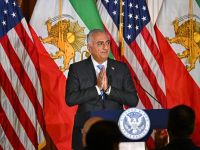The Republic of Iran, in a major move, recently invited applications from foreign banks and other financial institutions to operate in its free trade zones — the first such foreign involvement in the country since the 1979 Islamic Revolution.
Bahram Zarrin-Qalam, Central Bank Director on Banking Affairs, conveyed that administrative regulations were approved, paving the way for foreign banks and other financial institutions to operate in the special zones, Iran News reported.
"We need a banking system in our free trade zones which can operate without any restrictions and provide efficient services. It has to be in tune with economic activities in the zones…we want a financial system which is dynamically competitive, one which can compete with free trade zones in neighboring countries," he remarked.
Following the Islamic Revolution, Iran constitutionally nationalized all private banks (to prevent the outflow of national wealth), banning the entry of foreign banks in the nation. The country created free trade zones on its Persian Gulf Islands of Kish and Qeshm to attract investment in technology and to expand non-oil exports. In a landmark decision, the country recently legalized private banking in the nation in an attempt to increase efficiency.
According to expert, the change was an attempt by parliament to end the state monopoly on banking.
Iran's banking sector has struggled with the issue of reform, in recent years. Experts have long advocated the need for reform in the nation's regulatory laws. According to Mr. Bahram Zarinqalam, the Economic Affairs Director of the Central Bank of the Islamic Republic of Iran, the nation's banking industry lacks competition and suffers from unreasonable interest rates.
He said, "In order to improve the economic conditions, significant steps are being taken to privatize the banking system in relative terms. These actions include the transfer of 49 percent of the government owned banks' shares to the private sector. The role of the non-banking financial institutions will also be enhanced."
The reforms of Iran's banking sector are part of President Mohammad Khatami's plan to liberalize and streamline the state-dominated economy, widely seen as inefficient. The plan, which runs from 2000 to 2005, hopes to achieve ambitious growth targets, including an average 8.5 percent rise in private investment. –(Albawaba-MEBG)
© 2000 Mena Report (www.menareport.com)







